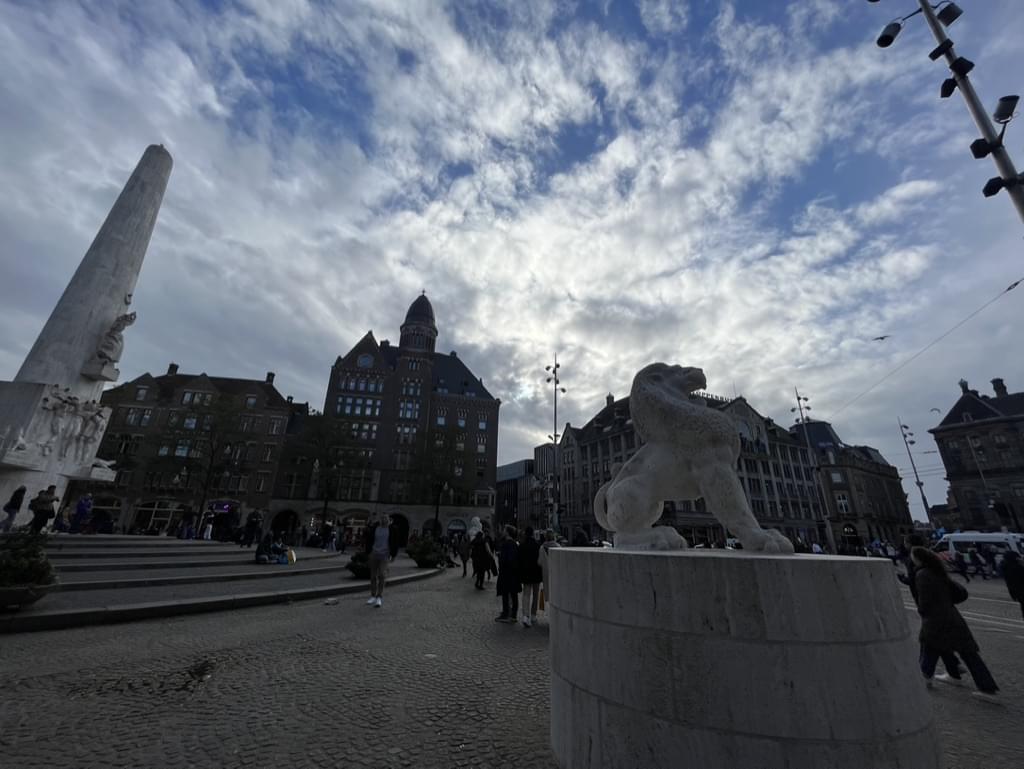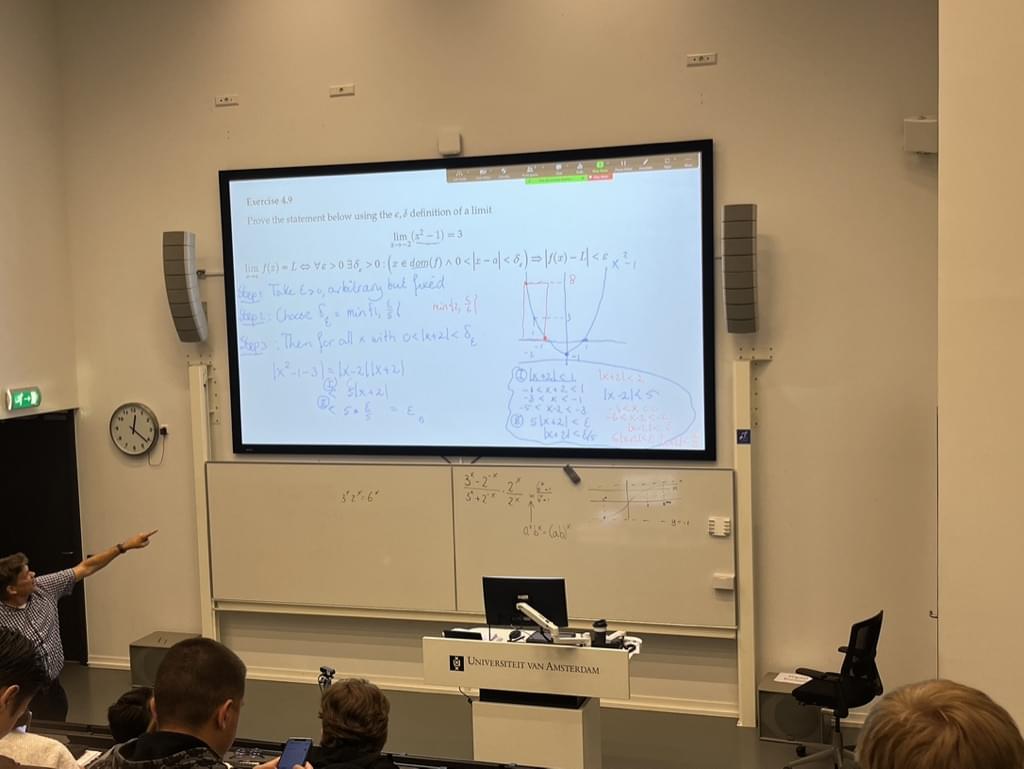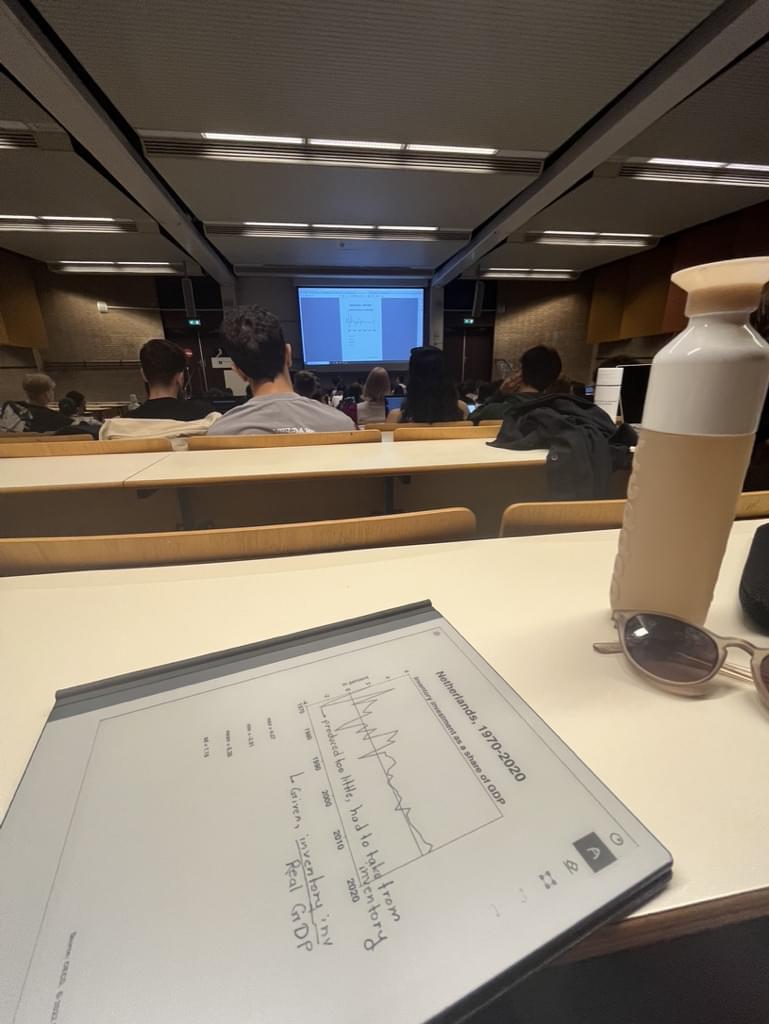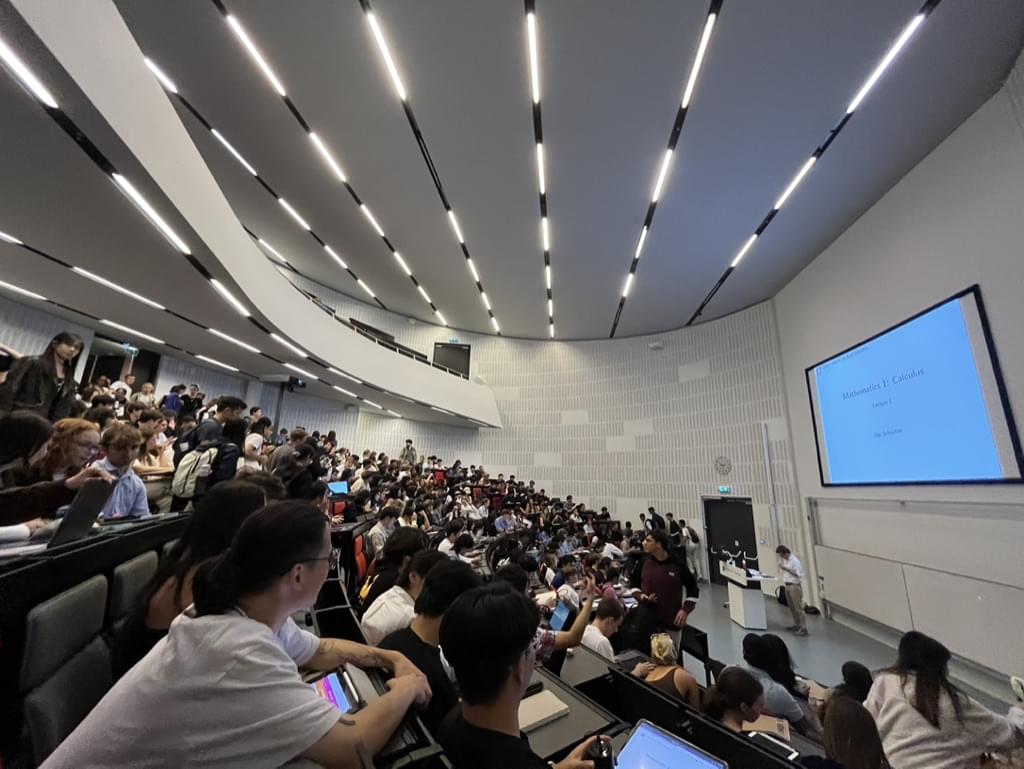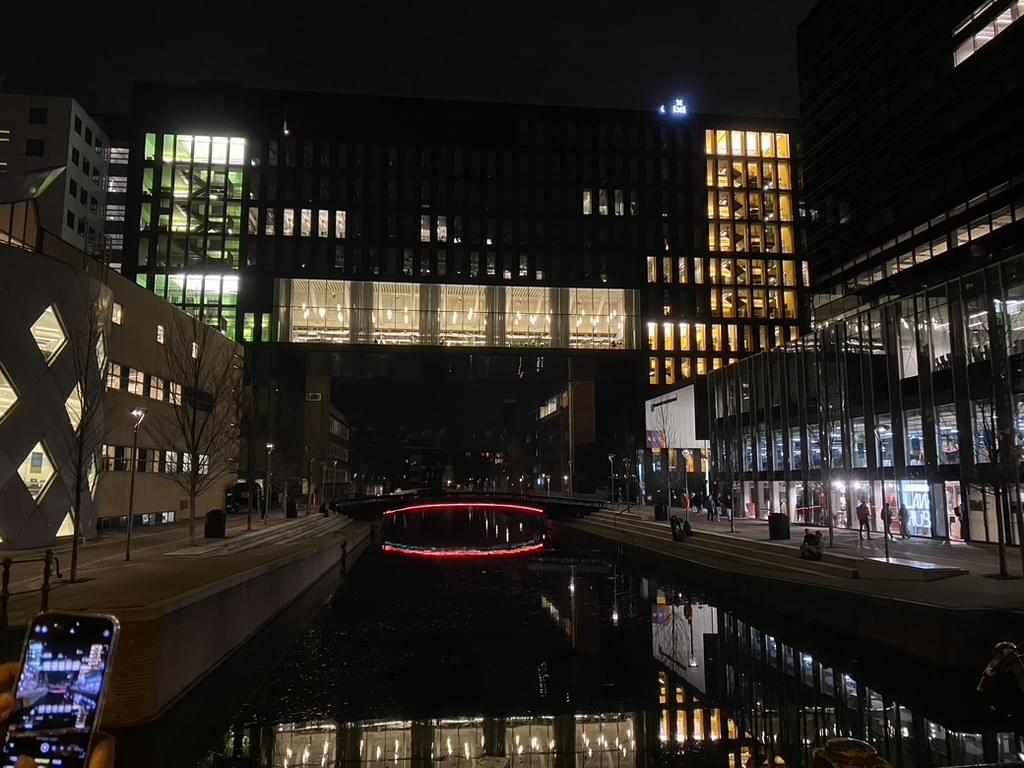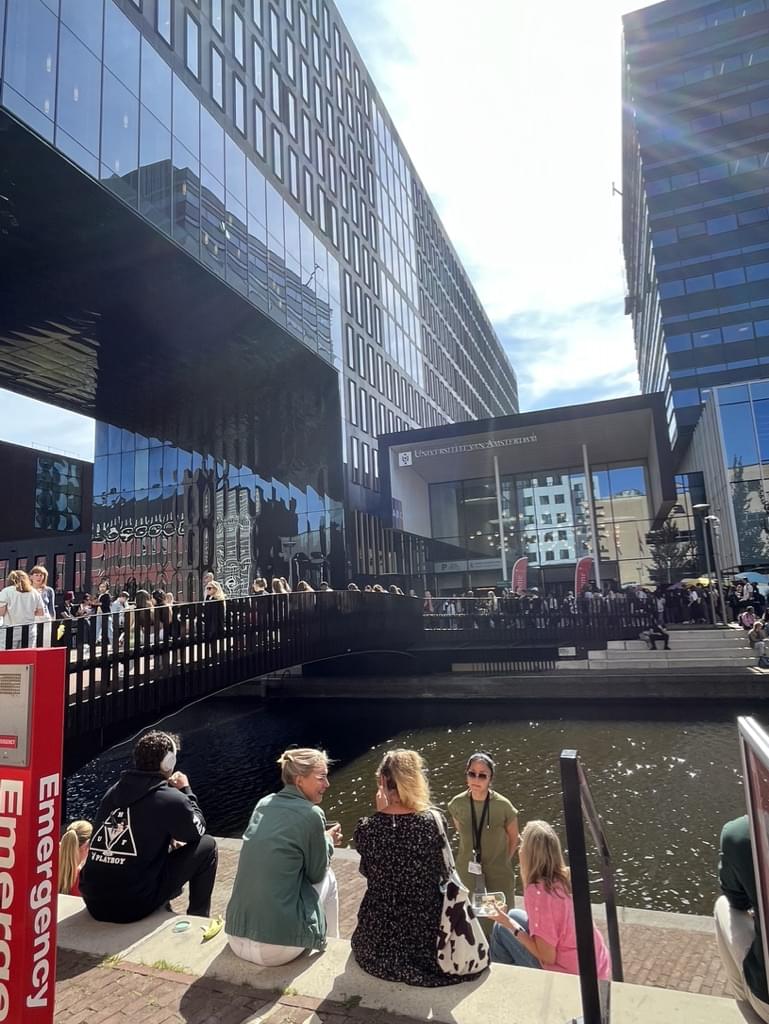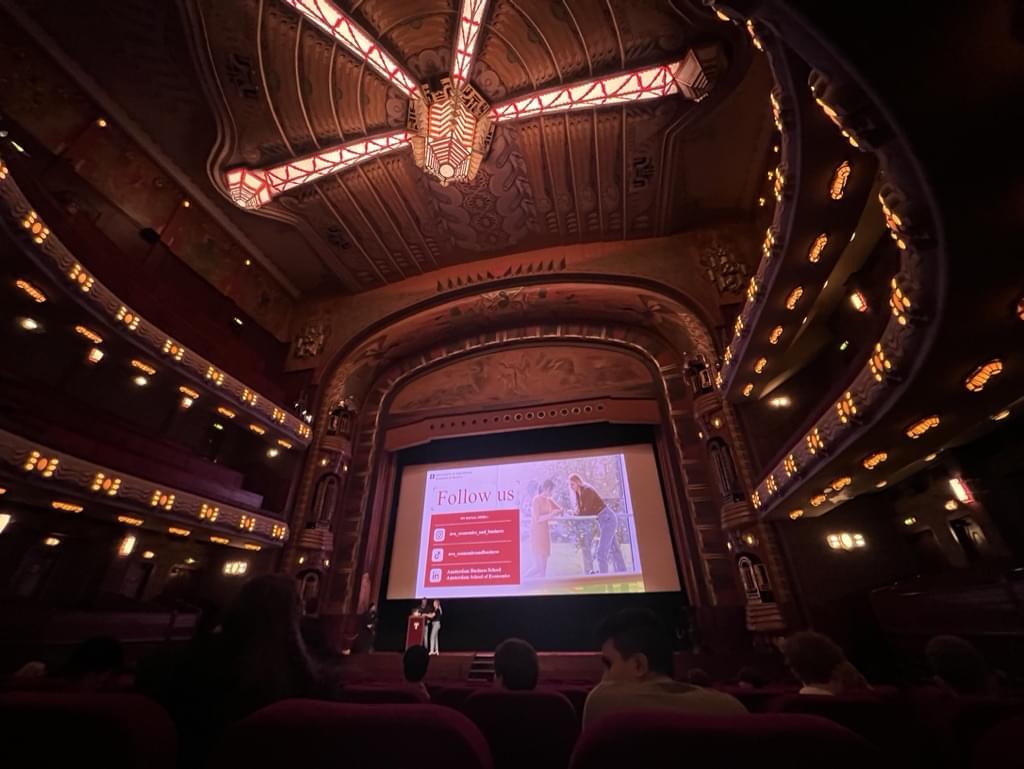What Students Say
Likes
- Intellectually challenging curriculum: The course that I am studying, Econometrics and Data Science, is a rigorous applied mathematic discipline that delves deep into statistics, pure mathematics, probability theory, programming and different data analyses.
- Campus spread across the city: We have lectures and exams in different famous locations across Amsterdam (theatres, terminals) and it is beautiful.
- International community: Amsterdam is the hub for all kinds of people, and to get like minded people is very easy.
Dislikes
- Difficult STEM major: my personal course had a 50% drop out rate, making you have to study majority of the time with high pressure and pace.
- Cold weather: Amsterdam can get really gloomy in the winters with short days and windy outdoors. The rain is very unpredictable too.
- No campus placements: after education you have to look for internships on your own. It is not very easy to find something.
Course Curriculum
-
Difficulty: The course is definitely challenging! It leans toward an advanced level, especially if you’re not already comfortable with mathematics and statistics. It’s a good mix of both theory and practice: we dive deep into theoretical concepts (like asymptotic properties, proofs, and derivations), but there’s also a strong practical focus through coding assignments.
-
Pros and cons:
-
The most positive aspect is the depth and rigor of the material it trains you to think analytically and apply methods to real-world data. The professors are generally very knowledgeable and approachable.
-
The most negative aspect would probably be the workload sometimes the pace is too fast, and the assignments can feel overwhelming, especially when multiple deadlines line up. Also, some courses are heavier on theory than others, which can be tough if you prefer hands-on learning.
Admission Experience
-
1. Erasmus University- rejected (Double major econometrics and philosophy, international business, ebe)
2. Tilburg university- admitted (econometrics)
3. Utrecht university- admitted (economics)
4. Maastricht University- admitted (economics)
5. University of Amsterdam - studying (econometrics and data science) -
I think I got rejected from Erasmus because they are really serious about academia and IB scores (specially english and math). While my math grades were at par, overall they were quite mediocre.
Why UvA?
Shared faculty with Erasmus, great professors, big city feeling. -
Admission process:
Step 1: Uploading IB predicted grades, CV and motivation letter. (November)
Step 2: I got conditional acceptance in 2 weeks. (December)
Step 3: Doing the UvA matching test: this is not a deciding factor for your admission, but compulsory to do as a part of the admission process. (March)
Step 4: Submitting final grades (August). -
Eligibility criteria:
IB requirement: Mathematics AA (Analytics and Approaches) Higher level, minimum 5. English A Standard level, minimum 4. -
Admission experience:
Out of all universities, UvA's admission process was the quickest.
Highlights: UvA matching gives you a precise idea for what your major is going to look like. Allows you to understand what to expect.
Challenges: Your math scores really matter, it turned out to be a deciding factor for many.
Intake 2023, the biggest challenge with coming to UvA remains to be the housing situation which has played a crucial role in people's ability to remain enrolled. Although with the current student housing infrastructures, it is not as bad as it was.
The admission process was very very quick. Took me 30 mins to apply. 2 weeks for their decision. Had my UvA matching which took 3 hours.
Class Schedule
-
Classes:
We have 2 courses per month (10 courses for the year).
4 lectures per week.
4 tutorials (smaller classrooms) per week.
7 weeks of classes, then exam week and then we move forward with the next courses.
There is a second chance for all exams, called resit. -
Class size:
Econometrics has 180 students. But Economics has 800. So it really depends on the major.
In classrooms we have 20 students.Indian students in my course are around 5. But that's because Indians find this course very difficult. But for Economics and other courses, there are ample indians and a community large enough to host diwali and holi events.
Faculty
- The faculty members are highly qualified, with strong academic and industry backgrounds. Most of them have PhDs from MIT Harvard and are actively involved in research, which keeps the curriculum current and relevant. They’re approachable and willing to clarify doubts outside class as well, whether via office hours or emails.
- The faculty-to-student ratio is 1:25 approximately. But they are very approachable and helpful. Plus we have study advisers who can help when you are facing stress, want to clarify what to take up in the future or to recommend workshops to adjust to uni life better.
- The teaching methodology is pure theory. It involves a lot of pre-reads before lectures and fast paced teaching. Their advice is to practice and solve a lot of questions. The smaller tutorials, however, are really good to clarify questions. But I have noticed, that it requires students to be very proactive to make the most of the faculty.
- The course content is very very relevant, since you learn programming and data analytics skills that can be applied immediately in industries.
- Finding jobs: You are on your own here. While they can help you with referrals, and they have a lot of workshops about making a good cv, good linkedin account, they don't take guarantee. I would still say, doing a quant major keeps your job prospects high enough.
-
I cant take the name of a specific professor that I admire the most, but there were a few:
1. Linear Algebra taught by Derya Guller. She simplified the math of this course and taught it in a very interesting manner.
2. Programming and mathematics 3 taught by jeroen Eijkins. He loves gamifying everything. He took some amazing examples and made these subjects super fun. Despite failing the first attempt, I learnt a lot.
3. Microeconomics taught by Doorp: Another great professor, very old with a lot of experience. Made us visualise things beautifully.
4. Mathematics 4 by maurice koster: he is the programme director and the funniest professor around. He was very blunt about the difficulty of the course and gave us enough challenge. he also published a reader for us to understand the course better.
Campus Life
- We have 2 big campuses and a few smaller ones.
- Roeterseiland: that's our main campus and it is huge from inside. It is not at the very center, but still a very busy area. There is a library, lots of cafes and restaurants and the municipality.
- Oudemanhuispoort: that's the main campus for com science and media students. It is right in the Amsterdam center and very beautiful. It is full of life, lots of lecture halls.
- We also have lectures in Aula Church, Tuschinsky theatre etc.
- USC: that's our sport campus, we have 3-4 in the city. There is swimming, tennis, badminton, everything.
- Amsterdam is known for their club life. The university's own festivals are on the first week of university (Intreeweek). Besides that there are famous concerts happening almost every week and the Rembrandtplein (party street) is full of Bachelor students.
- Sefa and VSAE : These are academic associations of the universtiy. They host a lot of career weeks where students often get hired on the spot. They also hold case club meetings, analytics team etc.
- ISAA (indian student association amsterdam) : They host a lot of movie nights and Bollywood parties. it is huge and almost all indians are a part of it.
- CREA: That's the hobbies association. Their campus is on Roeterseiland and they have a lot of opportunities for music, theatre and dance lovers.
Part Time Jobs
- Only the top 10 students Teaching Assistant (TA), Research Assistant (RA), or Departmental Assistant (DA) positions . And it is also paid (500-600 eur per month)
- Many students become ambassadors and take people on campus tours. That pays around 80 euros for 3 hours. There is another project called Pepperminds, where students get paid for bringing sponsorship for ngos.
- There is no maximum, but alongside studies students manage 8-12 hours.
- Hourly wage is around 15-20 euros per hour. In total they get about 500 per month. Getting a part time job is very easy, however, you first need an employment permit and that takes about a year to come. Looking for part time jobs is fairly easy because they post "hiring" signs in front of shops and enough advertising is done. Again, Amsterdam is a very student friendly place, so these things go smoothly.
Placement
-
Most students go for masters after my degree. But people who don't are easily employed, this is a high demand course, and the dutch recruiters know that.
3000-5000 euros is the average salary range that most students in our program can expect to earn upon graduation
Campus recruitment: Applying through career networking events, fairs and workshops.
Taking referrals from their networks is the best way to get something, these networks are found not only in serious events, but sometimes also in community events like indians in amsterdam.One advice: reach out to recruiters directly. That really helps with scoring at least an interview with the hiring manager.
-
The major companies that hire graduates from our program:
Quantco
Deloitte
Goldman Sachs
JP Morgan
ABN Amro
KLM .
Accommodation
- Finding accommodations :
- Since I live here with family that was sorted. But looking at the rental situation, we have consistently given rooms out on rent.
- To get housing here it is best to apply on: Diemen-Zuid OurCampus, Student Experience, The Social hub, and university's own housings. Also join whatsapp communities where there's ample subletting options.
- I recommend that you take even a place on rent for a month, if possible. Once moved here, students find it easier to look for a more permanent place.
- My place is 30 mins from the campus. Most students stay between 20-40 mins. There are indian students everywhere, so not an issue.
Exams
- No competitive exams required. They do make you give the UvA matching, but that is not a determinant for your admission.
- They require CV, motivation letter for some majors and marksheets.
- Psychology and Business Administration are numerus fixus courses with their respective exams made by the university.
- No interview part of the application was there .
Fees
- Tuition: 10,000 euros.
- Rent Accommodation: 700-1200 euros.
- Fees are charged annually, with options to loan, scholarship etc.
- Monthly expense: 300-500 euros (food groceries and coffee), 100-120 euros (public transport metro, tram, bus, train), 800-1200 euros (rent)
- Students that get student accommodation save money of rent, but it is a lottery system.
Scholarship
- UvA surely provides scholarship opportunities. I have a friend who studied CBSE in Jaipur and got 100% scholarship from the state government in India.
- Academic scholarships are also granted.
- Moverover, UvA gives a lot of options to pay your fees in installments and gives discounts when supported with enough evidence for financial complications.
- The university advisors are accessible to both students and non-students to understand this better.


